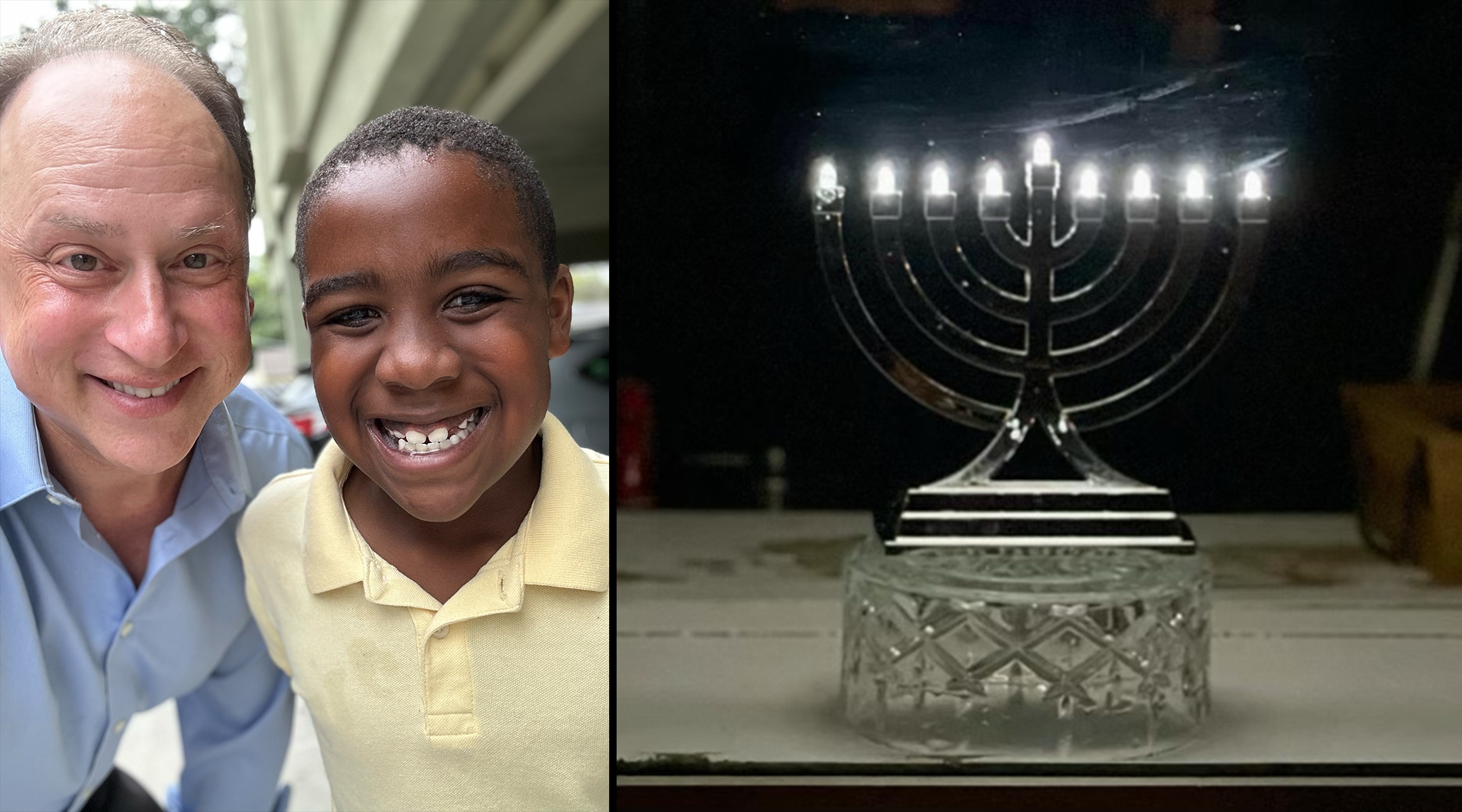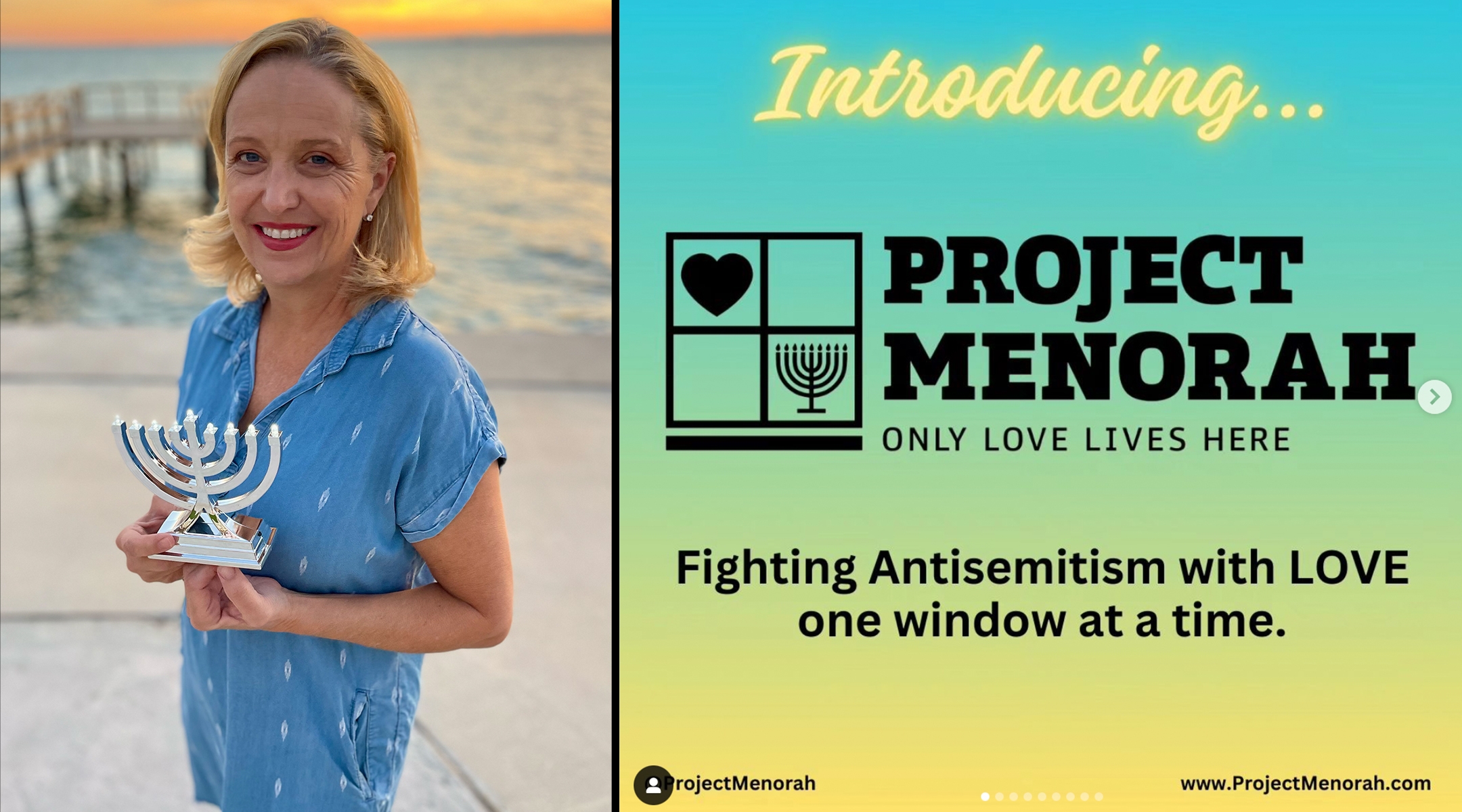A Jewish dad says he’s afraid to light a menorah this Hanukkah. So he’s asking non-Jews to display them in solidarity.
Adam Kulbersh’s “Project Menorah” campaign encourages non-Jews to display menorahs in their windows as an expression of solidarity during Hanukkah

At left: Adam and Jack Kulbersh. (Courtesy Adam Kulbersh). At right, the photo Jennifer Marshall sent them of her Hanukkah menorah. (Courtesy of Jennifer Marshall)
(JTA) — When Adam Kulbersh’s 6-year-old son Jack asked when they would be putting up their Hanukkah decorations this year, Kulbersh wasn’t sure if it was such a good idea.
With reports of antisemitism on the rise — exacerbated by the war between Israel and Hamas — Kulbersh, an actor and single father who lives in Los Angeles, said he was afraid to publicly identify his family as Jewish. In the past few months alone, multiple antisemitic incidents have rattled the L.A. Jewish community — including a home invasion in which locals believe the house was targeted because of the mezuzah signifying that Jews live there.
When Kulbersh relayed his concerns to his friend Jennifer Marshall, who is not Jewish, he recalled that her response was immediate: “She said, ‘We’re not Jewish, but we’ll put a menorah in our window for you as a show of solidarity, and in the hopes that it gives you whatever you might need in order to put one in yours,” Kulbersh told the Jewish Telegraphic Agency.
The gesture moved Kulbersh — so much so that it inspired him to launch an online campaign he’s calling “Project Menorah,” which encourages non-Jews to display menorahs, or photographs of them, in their windows during Hanukkah and to share photographs online to show solidarity. The campaign began last week, ahead of the holiday, which begins Thursday night. It has quickly spread on social media, where people are tagging Project Menorah in pictures of their holiday displays featuring newly added menorahs.
“I think right now people want to help but they don’t know what to say,” Kulbersh said. “People are afraid of saying the wrong thing, being canceled, of not knowing what they should say or how to say it. But what this friend did, out of love, a simple gesture, meant so much to me.”
For Marshall, a longtime friend of Kulbersh who lives nearby, it was an easy decision.
“I was just sad that Jack and Adam couldn’t celebrate Hanukkah the way that they wanted to,” Marshall told JTA. “Part of me felt like there wasn’t really much I could do. And I thought, I’m going to get a menorah, and I’m going to put it in my window and I’m going to take a picture of it and I’m going to send it to Jack. It was actually very simple. I just wanted Jack to know — and Adam, but Jack, this young boy — that his celebration of Hanukkah was important.”
Marshall, who runs an advertising agency and has helped out Kulbersh with his son since Jack was young, said emulating the Jewish custom of placing menorahs in the window — in public view — was “the most natural thing to do to say ‘I stand with you.’”

Jennifer Marshall posing with her menorah; an Instagram graphic advertising “Project Menorah.” (Courtesy of Jennifer Marshall; screenshot from Instagram)
She also views it as an important conversation starter.
“It’s an opportunity for the people who walk by my house or come to my house to have a conversation,” Marshall said. “I wanted it to be something private for Jack, and at the same time, I wanted it to be something public for every Jewish person.”
Kulbersh said the response to his campaign, including from rabbis, has been overwhelmingly positive.
Rabbi Joseph Potasnik, executive vice president of the New York Board of Rabbis, welcomed Project Menorah saying: “This year we need to stand with those who stand with us. I encourage non-Jews to put a menorah in their window as a show of solidarity.”
Kulbersh has seen posts from dozens of U.S. states — he said he stopped counting after 22 — as well as from Australia, Germany, Italy, Canada and the United Kingdom. In one representative Facebook post, an orthodontist in Dallas shared the project and offered to buy menorahs for any of his non-Jewish friends who wanted to participate.
“We’re in a time of awful antisemitism, historic levels,” Kulbersh said. “I think the idea of inviting our non-Jewish allies to add their light to ours in a time of darkness has really moved people.”
Kulbersh’s campaign is the latest instance of non-Jews using Jewish symbols to express solidarity.
Potasnik remembers when, years ago, the late Cardinal John O’Connor “put a menorah in his window.”
In a famous example from Billings, Montana, in 1993, thousands of people displayed menorahs in their windows after a brick was thrown through the bedroom window of a 5-year-old Jewish boy who had a menorah displayed. The episode inspired the award-winning documentary “Not In Our Town” along with campaigns preaching tolerance.
And just last month in Los Angeles, non-Jews offered to put mezuzahs up on their doorposts to show solidarity with their Jewish neighbors after the antisemitic break-in rattled the community.
Though Kulbersh’s campaign resembles the response in Montana, neither he nor Marshall had heard the story until he launched Project Menorah. Kulbersh said he chose the symbolism of the menorah because of Marshall’s reaction — had she offered to display a dreidel, he said, the campaign would have been centered around that instead.
“What I love about the story of Billings is it proves the point that in every era, the bigots find a reason to hate us,” he said. “And in every era, the Jewish people find the courage to stand up to it. And in every era, there are allies who find the compassion to stand with us.”
For some, the initiative is raising uncomfortable questions, including about whether relying on non-Jews to create real or perceived security is healthy for Jews, and whether it is appropriate to give non-Jews license to use Jewish symbols.
“I believe relying on camouflaging your Jewish identity and plausibly denying your Jewishness, or in this case having our non-Jewish neighbors light menorahs to help us do so, to survive, is spiritually damaging,” wrote one man in Austin, Texas, on Facebook after the Jewish communal organization there, Shalom Austin, promoted Project Menorah.
Kulbersh acknowledged that some view the use of Jewish religious symbols by non-Jews as problematic — or even cultural appropriation. He emphasized that Project Menorah is different.
“This is an act of solidarity in a time of historic antisemitic violence. We are not asking anyone to perform a religious ritual,” Kulbersh said. “We’re asking people to take an easily recognizable symbol of a Jewish holiday and put it in their window to show their friends and neighbors that they’re safe.”
Wil Gafney, a pastor, activist and professor at Brite Divinity School in Texas, told JTA she is worried about Christians using Jewish symbols without proper approval from Jews, a trend that has included Passover seders and the use of shofars in right-wing rallies.
“There is a swath of Christianity, primarily evangelical and sometimes fundamentalist, that appropriate Jewish holidays, rituals and ritual objects in a way that the majority of Jewish voices in the public and social media spaces I inhabit and the persons in my extended community and family find extraordinarily objectionable,” Gafney said in an email to JTA.
“My first thoughts about this project when I saw it on my social media was that this contradicts the message of Christians leaving Jewish things alone and may well embolden some who now feel they have license and permission to use Jewish ritual objects.”
Marshall said she doesn’t know if it should be considered appropriation but said she has not received any pushback for her menorah.
“If anybody knows me, they know that it would just come from a place of love,” she said. “It was a very simple gesture of love for Jack and the Jewish community.”
For Rabbi Emily Cohen, who leads the Reconstructionist West End Synagogue in New York City, the idea of non-Jews using a Jewish ritual object without a full understanding of it, or without a connection to a Jewish community, is troubling. She does, however, like the idea of non-Jews displaying photographs of menorahs.
“That’s something that makes it clear, I’m not actually lighting a menorah, but I am putting up this photo that shows that I care about the Jewish community and I don’t want them to feel alone at this season,” Cohen said.
Cohen added that to her, the best forms of solidarity are ones that are grounded in relationships, not just a simple social media post. In other words, she said, the best way for non-Jews to show they care about their Jewish friends and neighbors is to support them as they “do Jewish with other Jews,” Cohen said.
She cited the example of a group of Muslims who, after the Tree of Life synagogue shooting in 2018, gathered outside Congregation Beit Simchat Torah, the prominent LGBTQ synagogue in New York.
“They were not going to the service, they were just standing outside to offer that solidarity and protection for their Jewish neighbors as they were going through this horrible moment after this attack,” Cohen recalled. “That’s the thing with solidarity: if you’re engaging in solidarity without actually engaging in relationship, that doesn’t feel as valid as if you’re engaging in relationship as part of your show of solidarity.”
Kulbersh said he welcomes the dialogue about whether non-Jews should display menorahs. “I love that about Judaism — we debate, we discuss,” he said.
But ultimately, Kulbersh added, he wasn’t looking to start a movement. In fact, he said his hope is that “there is no future for Project Menorah, because there will be no need for it again.”
Stewart Ain contributed to this report.
This article originally appeared on JTA.org.
A message from our Publisher & CEO Rachel Fishman Feddersen

I hope you appreciated this article. Before you go, I’d like to ask you to please support the Forward’s award-winning, nonprofit journalism so that we can be prepared for whatever news 2025 brings.
At a time when other newsrooms are closing or cutting back, the Forward has removed its paywall and invested additional resources to report on the ground from Israel and around the U.S. on the impact of the war, rising antisemitism and polarized discourse.
Readers like you make it all possible. Support our work by becoming a Forward Member and connect with our journalism and your community.
— Rachel Fishman Feddersen, Publisher and CEO



















